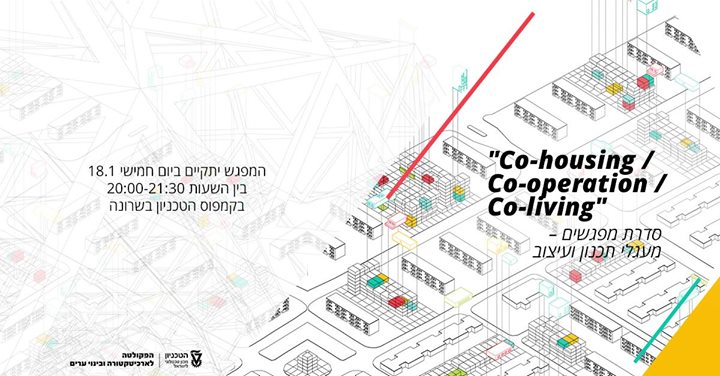Thu 18 January 2018 | 8:00 pm - 9:30 pm
Technion - Technion, Haifa,

Meeting Number 3 Final project in Sharona 18 January 2018
Presenters: Adi Elhalal “Friendly capitalism”; Yulia Shluchin “Community creates agriculture creates community”;
Gilad Alfasi “Homey: Stop looking for home”
Moderator: Dr. Dikla Izhar
With:
Dr. Talia Margalit, Tel Aviv University
Sebastian Wallerstein, Director of the Hagar Center for R & D and Social Housing Policy, Faculty of Law, Tel Aviv University
The question of housing as a quantitative crisis now leads to uncontrolled environmental development. This development is not aware of the destructive future implications inherent in it: What will be the image of the future city? What is the everyday that this city invites us to, and what are its values?
Thinking about housing in terms of partnership and participation served as a starting point for students in the Technion’s final project to challenge market-based housing models and existing urban development. Cooperative economic perceptions, civic activism, self-organization, and social entrepreneurship have been a supportive conceptual environment to explore the potential of new organizations to develop affordable and affordable housing and supportive living environments. In this context, residential living was examined as a complex systemic question: what models can be developed in existing socio-economic reality and how can they be integrated into concrete urban situations? What collaborations do they need and how they allow users to take part? What common life forms do they invite? And how can they support the stabilization of an existing community? From this, the question of physical space arose – what are the spatial meanings of such networks and how can they serve as a engine for new urban development?
This discussion will be examined through three projects developed in different contexts and will present three alternative models of organization and cooperation for the purpose of initiative, financing, development and coexistence. The processes developed offer dynamic, process-oriented and open-ended planning approaches as a basis for re-articulating responsibility, participation and interaction. The meeting invites discussion of the potential of the architectural vision to formulate cooperative mechanisms and examine the possible implications for the city and society and their applicability to the production of housing. This discussion also allows us to ask again about the role of architects within the new networks: on the interface with social actors and different fields of knowledge, on possible alternative practices and on the direction of shared discourse.
Check Out The Event Page On Facebook
